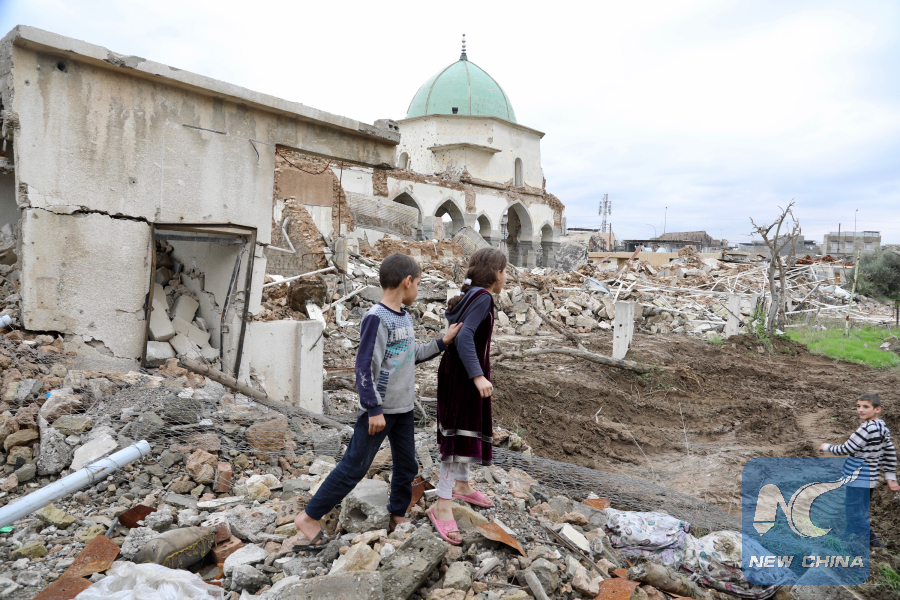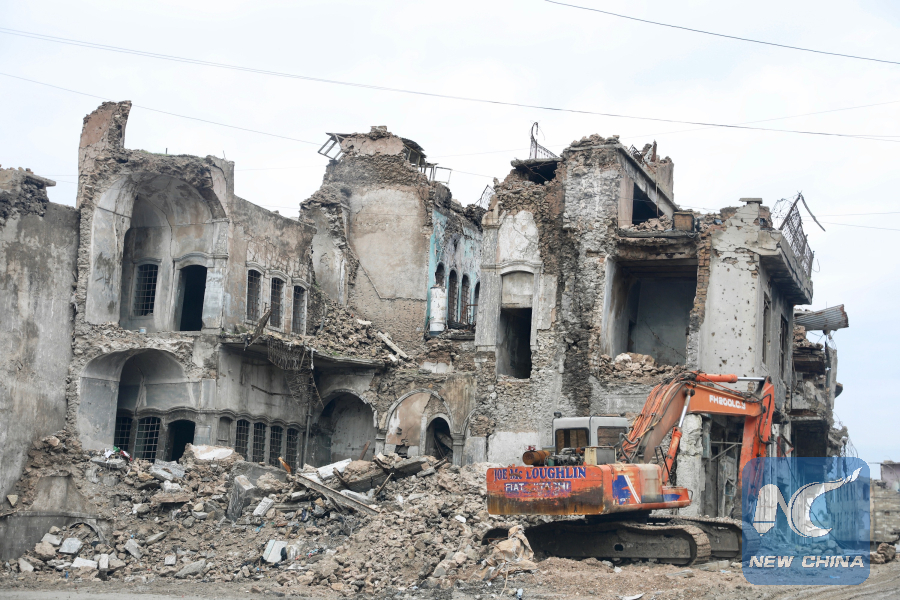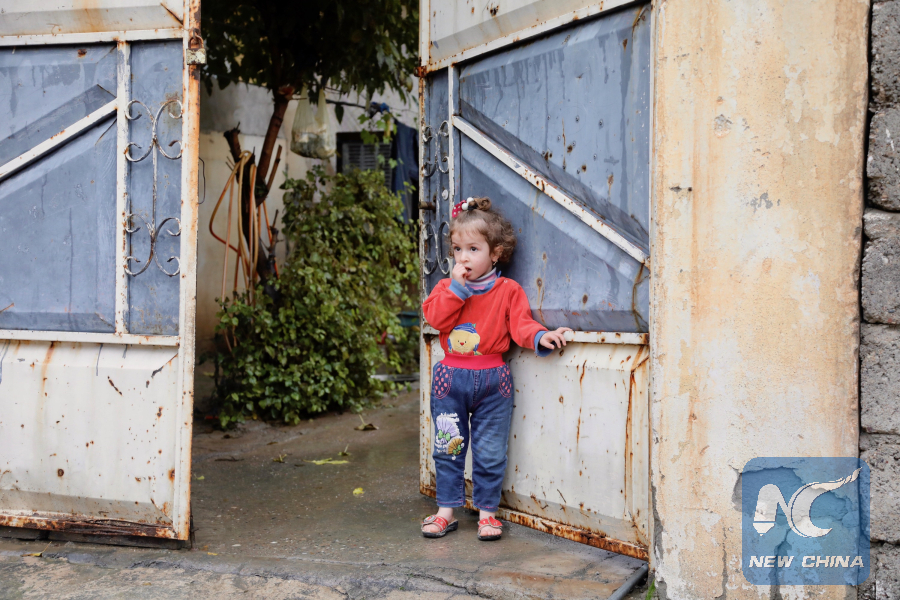
Photo taken on Dec. 6, 2018 shows several children playing at the edge of the ruin site of al-Nuri Mosque in the Old City of Mosul, nothern Iraq. (Xinhua/Khalil Dawood)
MOSUL, Iraq, Dec. 9 (Xinhua) -- A year has passed since Iraq announced full liberation from the Islamic State (IS) militant group, but Iraqis are still desperately struggling to restore their normal life amid lackluster reconstruction process.
In Mosul, the capital city of Iraq's northern province of Nineveh, life restoration is running faster in the eastern side, which witnessed fewer battles than the western side.
In one of the fiercest battles since World War II, IS extremists stayed holed up in the narrow alleys of Mosul's Old City center, where they booby-trapped buildings and planted a large number of roadside bombs.
The battles killed thousands of innocent people, with dozens of thousands of buildings damaged or destroyed, including the iconic al-Nuri Mosque and its leaning minaret.
Nevertheless, defiant residents in Mosul have never lost hope in their efforts to rebuild their beloved home city.
Sabhan, 47, a resident in the Old City in western Mosul, returned to home immediately after the defeat of IS militants in July 2017, as his house was only slightly damaged in the battles.
"I am repairing the damage step by step whenever I can collect some money, and many of my neighbors are also doing so," Sabhan told Xinhua.
"Many families are unable to return because they need compensations from the government. They lost their jobs and savings during the years of displacement when the IS took control of the city after 2014," he noted.

Photo taken on Dec. 6, 2018 shows a shovel truck clearing debris in the Old City of Mosul, northern Iraq. (Xinhua/Khalil Dawood)
Muthanna Fadhil Younis, 37, is one of those unable to return to home in the old city because he lost his job of fixing refrigerators and washing machines, in addition to the expensive treatment for his two daughters who suffer from kidney disease and malnutrition.
"There were no food, no medicine, no milk for infants. My youngest daughter was born in 2015. I was almost lost her because she was very weak because of malnutrition," Younis said.
IS extremist militants "left us dying by diseases, hunger and bombing and ... prevented us from leaving our homes to safety with the Iraqi security forces," he added.
Younis is now working as a wireman and lives with his family in a small cold rented house in the eastern side of Mosul.
Like many other traumatized people in Mosul, Younis is yearning to return to his destroyed house. However, he cannot afford to rebuild it.
At a small coffee shop in the Old City of Mosul, a group of men were exchanging views on the corruption issues in the slow reconstruction process.
Reconstruction "will continue slowly because there is no genuine sign for serious efforts to rebuild the city because of corruption," said Abu Mohammed, a member of the group.
On Thursday morning, shove-trucks came for the first time to begin removing debris from the site of the ancient Great Mosque of al-Nuri, which was destroyed in the middle of 2017 during battles to dislodge IS militants from the Old City center.
"Removing the debris was preceded by checks to defuse bombs possibly planted by IS militants," Ahmed Ghazi, an officer from the engineering force of the army's 16th Division, told Xinhua at the scene.
In April, Iraq, the United Arab Emirates (UAE) and UNESCO signed a partnership agreement to rebuild the historic mosque, which was erected in 1172 along with its famous leaning minaret, which gave the city its nickname "al-Hadbaa," or "the hunchback."

Photo taken on Dec. 5 shows an Iraqi girl standing in front of her rented house in Mosul, northern Iraq. (Xinhua/Khalil Dawood)
The al-Nuri mosque is of great symbolic value, as it was where the IS leader Abu Bakr al-Baghdadi declared his cross-border caliphate in Iraq and Syria in his sole public appearance in July 2014.
"The reconstruction of this mosque (al-Nuri) is an important step that would give people hope, as the reconstruction of the historic al-Nuri Mosque and its leaning minaret would encourage tourism, hence providing jobs for residents," said Jamal al-Mosuli, who lives in an old house near al-Nuri Mosque.
Abu Ahmed Dha An-Noon, another resident of Mosul, also sees a "positive sign" for a serious start to rebuild the mosque which is part of the identity of Mosul, the second largest city of Iraq.
"So far, nearly 30 percent of the residents have come back, but with the rebuilding of the mosque, I believe the rate will increase to 70 percent," Dha An-Noon told Xinhua at the scene.
Back in 2014, the IS militant group announced the establishment of a Caliphate over a large swathe of territories across Iraq and Syria.
Since then, the Iraqi forces backed by an international coalition fought three years of fierce battles to free the country from the extremist militants.
On Dec. 9 of 2017, then Iraqi Prime Minister Haider al-Abadi, also commander-in-chief of Iraqi forces, officially announced the full liberation of Iraq from IS militants.

